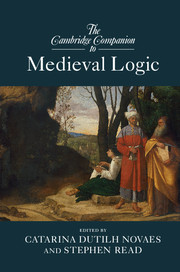Introduction
Published online by Cambridge University Press: 05 September 2016
Summary
THE SCOPE OF MEDIEVAL LOGIC (IN THIS VOLUME)
What counts as “medieval logic”? The Middle Ages is traditionally conceived as the period between the fall of the Roman Empire in 410 and the fall of the Byzantine Empire in 1453 (alternative end dates are Columbus’ first trip to the Americas in 1492 or the Protestant Reformation in 1517). So technically, logical theories and traditions of roughly between AD 500 and 1500 could all qualify as belonging to the realm of “medieval logic”. In practice, however, this is not what most of us have in mind when we speak of medieval logic; we tend to think specifically of textual material in Latin, produced within Europe, and typically from the twelfth century onwards. Moreover, there is the issue of delineating what is to count as “logic” among the different theories and topics, as the borders between logic, grammar, metaphysics, theology, etc. were then rather fluid.
For this volume, we have chosen to adopt geographical borders going beyond the usual Eurocentric narrative, even if only slightly, and this has meant in particular including the rich Arabic tradition (more on this choice shortly) alongside the Latin tradition. We also sought to be more inclusive on the temporal dimension by taking into account developments in the so-called Early Middle Ages, though the focus remains on later developments.
The inclusion of the Arabic tradition is a very natural choice, for a number of reasons. First, the Latin and the Arabic medieval logical traditions are strongly connected thanks to the prodigious influence of one author, namely Aristotle. Indeed, these two traditions are best studied in tandem, as they originate against the background of the same authoritative texts (especially Aristotle's logical works), and as cross-fertilisation (especially the influence of Arabic logic on the Latin tradition) regularly occurred. Second, in recent years, scholarship on Arabic medieval logic has attained a level of maturity that allows for detailed analysis at an accessible level, even if it is not yet as thoroughly studied as the Latin tradition.
These two kinds of consideration also motivate the choice to exclude a number of traditions we might have included in the volume.
- Type
- Chapter
- Information
- The Cambridge Companion to Medieval Logic , pp. 1 - 16Publisher: Cambridge University PressPrint publication year: 2016



